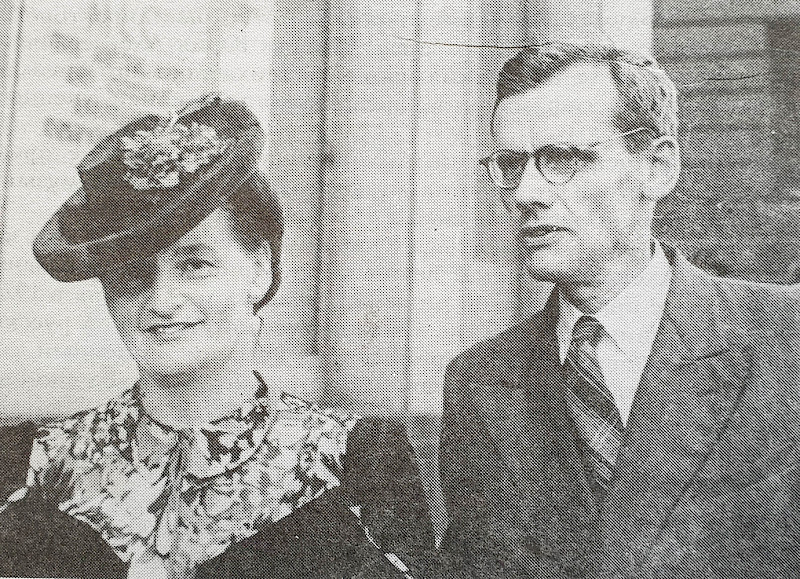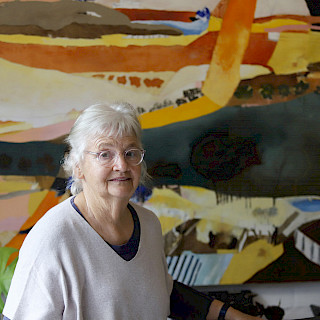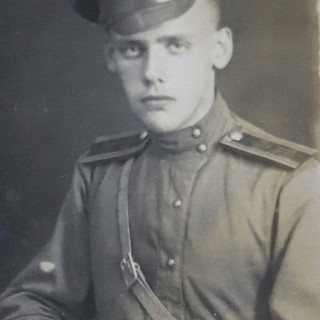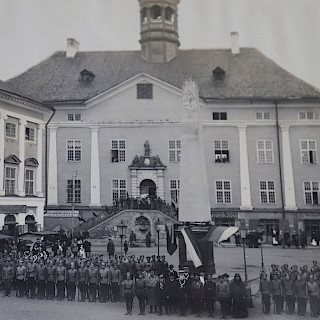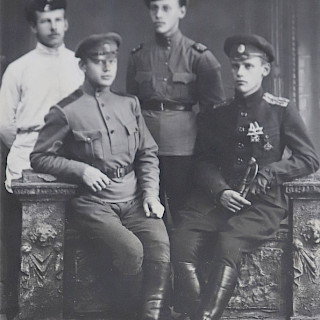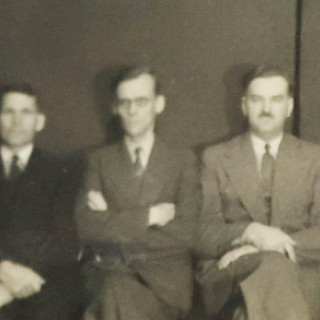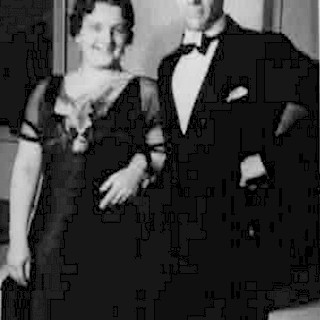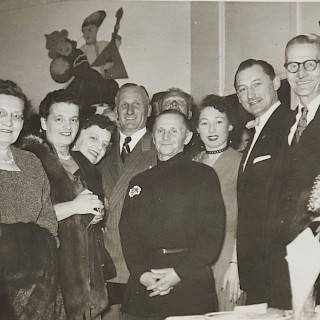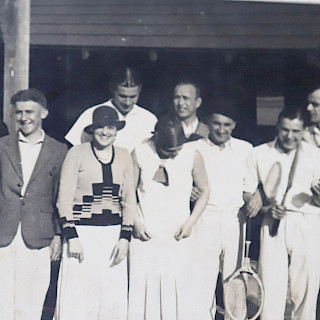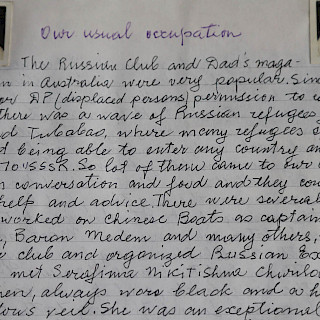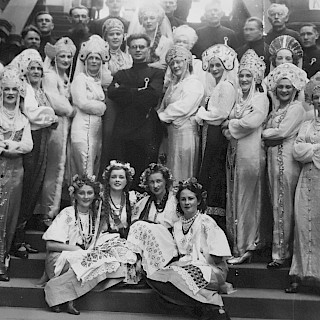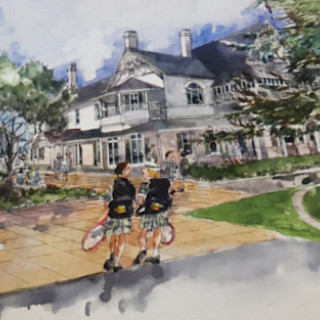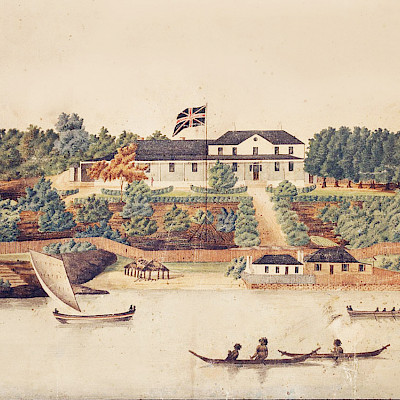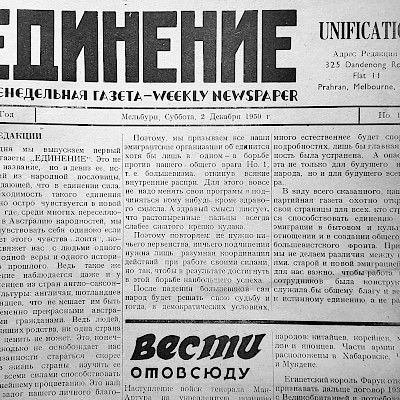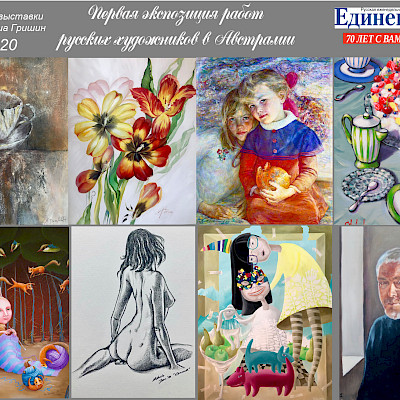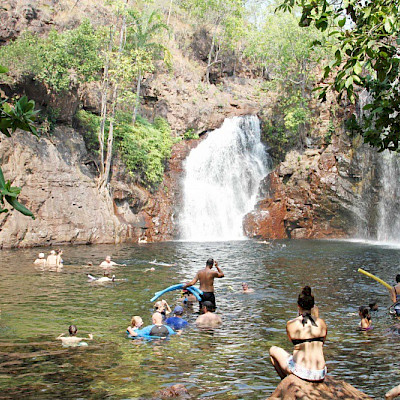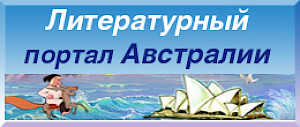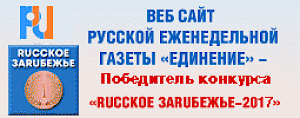Each story of Russian people who found themselves in Australia, told by "Unification", usually has its own background and reason. This story is no exception, from which we learn about the Davidenkov family, who have actively participated in the Russian life of Sydney since the late 1920s.
The reason is the important role of Yuri (Georgy) Alekseevich and his wife Irina Aleksandrovna Davidenkov in the history of Russians in Australia and, in particular, in the formation of the Russian Club in Sydney. And the reason was a note by the Sydney amateur and researcher of history Tsvetana Spasova in the newspaper "Edineniya", where she published a photo of the Davidenkov family and Konstantin Lyubarsky.
After this publication, the daughter of the Davidenkovs, Irina, called me, and soon I went to talk with her to an interesting house on the shore of Watsons Bay.
The materials of this publication are the results of this two-hour conversation, as well as additional information that I gleaned in the article by Natalia Melnikova and Innokenty Suvorov in No. 9 of the Australiada. Russian Chronicle "for 1996.
First, let me remind you some general information.
Yuri Davidenkov and his future wife Irina arrived in Australia at about the same time, in the end of 1920s, but from two opposite directions: from Western Europe and Asia - from Harbin.
Yuri was born in St. Petersburg in 1897 in the intelligent family of the principal of the gymnasium. At school age, the family moved to Narva, spent the summer in a country house in Finland. When the First World War began, Yuri studied at the famous Mikhailovsky Military Artillery School. He participated in the battles of the First World War and even received a medal. During the Civil War, he fought in the cavalry of the White Army. Daughter Irina says: “Being a pacifist by nature, it was not easy for him in the war. He became very ill, and his family left through Latvia and Poland to the city of Danzig (now Gdansk). There my father began to study architecture. After that, he left for London, and from there planned to go to New Zealand, possibly away from armed conflicts. Before reaching New Zealand, he lingered in Sydney, which became his place to live for the next 50 years. Soon he met my mother. They were married in 1934 in the Greek Orthodox Church in Sydney Darlinghurst by Father Methodius.
Mum was born in Irkutsk. Her father, Colonel Alexander Belinsky, came from the nobility of the Vilna province, served in law in the Far East and in Irkutsk. After the revolution, the family left for Harbin, and in 1929 went to Australia. Here my mother immediately joined the life of the theater group at the Russian Club, worked in the library, when she met my father». Later she was the first teacher of the Russian school at the Russian Club.
In many ways, Yuri and Irina were brought together by a joint sports interest - playing tennis. They rented a tennis court in Bondi and other parts of the Eastern regions: Cooper Park, Clovelly, where many of the club members played. Irina Alexandrovna said that she played tennis until she was 75 years old.
The family settled in a house on Bondi and raised three children - two of their own, Alexei and Irina, and godson Vladimir Yudaev, who lost his mother early.
Yuri Alekseevich's architectural diploma was not recognized, he had to look for another job. He gave music lessons, was engaged in drawing. He later enrolled in his final year at NSW University's Faculty of Architecture and after that worked for 20 years in the specialty, designing and building hospitals and other public buildings.
Daughter Irina tells: “My mother kept a diary very carefully, with beautiful handwriting, from where you can learn many details about the life of the family and, in general, about the Russian community of Sydney at that time.
I think people don't know a lot of what my father did. It is known that he started the Russian club (Yuri Alekseevich was the second chairman to recreate the club after the fire of 1930. Ed.), He published the magazine "Russian in Australia". But few people know that in the late 1940s-early 1950s he traveled to Canberra, where he met with the country's prime minister and told him about a large group of Russians, the so-called DP (Displaced persons), who ended up in Europe and China, and helped to resolve their arrival to Australia. After that, the immigration of Russian people to the fifth continent went much faster and in greater numbers. This also applied to the several thousand people who had been in a camp on the Philippine island of Tubabao for several years.
Mom and Dad first met two important immigrant officials in Sydney, Mr. Barnwell and Brigadier Frederick Gallagher (Blackjack) Galleghan. They took them to the Russian Club, introduced them to club members to give an idea of the Russian community, and even showed them how club members live at home in order to explain how Russians acclimatize to a new environment. These gentlemen also asked who was coming to the club and asked for new members to be reported so they could find out where these people came from. The authorities were afraid of the communist influence of the USSR, and the parents were afraid of possible actions of the NKVD and later the KGB. By the way, across the street from the Russian club there was another “Soviet” Russian club.
My father also participated in the creation of the first Sydney Russian Orthodox church St Vladimir. He and my uncle bought a house for the church in Centennial Park, and invited the first priest. He also made plans and helped build the Kentlin Temple.
From 1930 to 1941, Yuri Alekseevich was the chairman of the Russian Club in Sydney and remained on the board for many years. For the first three years, the club was being restored after a big fire, during which documents and books were burned. He had to create a new charter. In 1933, the club reopened. When Russians began arriving from China and Tubabao in the early 1950s, many came to the club, where they were received and helped. In her diary, Irina Alekseevna mentions that among the arrivals were naval captains and officers, two Waxmouth brothers, Baron Medem, who, together with others, created a club of military veterans at the Russian Club. She also recalls the wonderful woman Serafima Nikitichna Churilova, who organized a library of army and naval literature at the club.
The parents were well acquainted with the owners of the first cafes in Sydney - the Repins. His father wrote his logo - the name on all the cars that delivered food for these cafes.
Among their friends were also the Lukins, Pulkovnik, Gorbov, Tyshkevichs, Baygildins, Petrovsky. Zharov's Don Cossack Choir came to Sydney, and his parents met with the choir.
Yuri Alekseevich lived for 84 years and died in Sydney in 1981. Irina Alexandrovna celebrated her centenary in 2007. I met Irina Alexandrovna at the Russian club at that time. I was surprised how dignified, even majestic, she kept herself at that age. The old schooling has not been lost over the years. Her daughter told with a smile that her mother, in meetings, "always looked important and sat down next to the bishop." She passed away in 2012. Yuri Alekseevich and Irina Aleksandrovna were buried in the Russian section of the Rookwood cemetery.
The son of the Davidenkovs, Alexei, graduated from the military school in Canberra and rose to the rank of major. And daughter Irina, who told me and showed me numerous photographs, studied at the University of Sydney as an architect and worked for many years in her specialty. In 1967 she also married an architect. For several years she worked in the United States, while her husband was doing a Masters degree there at Harvard University, then they returned home, built a modern house for themselves in Watsons Bay, not far from the first biological station where Miklouho-Maclay worked.
On the walls of the house there are numerous paintings painted by husband Collin and Irina, as well as their daughter, who also became an architect in the footsteps of her parents. Entering their sunny house, it is clear that they lived a long and happy life here, just as life in Sydney was happily with Irina's parents - Yuri Alekseevich and Irina Alexandrovna Davidenkov, old-timers of the Russian community in Sydney. Their name is forever associated with the Russian Club, which in a few years will celebrate its 100th anniversary.
Vladimir KOUZMIN
Thanks to Alexey Ivachev for additional information.



